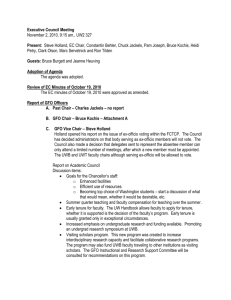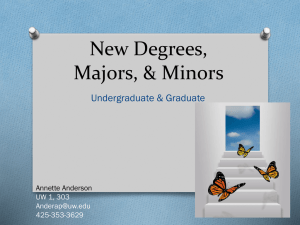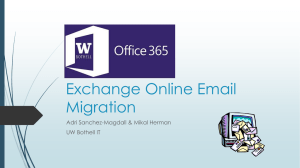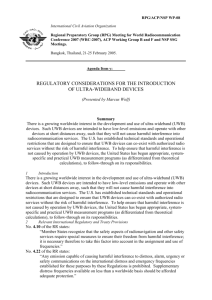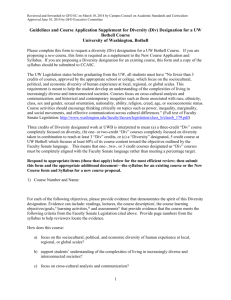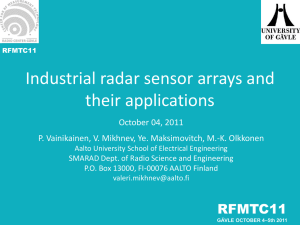Executive Council Meeting November 6, 2012, 8:45 am., UW2 307
advertisement
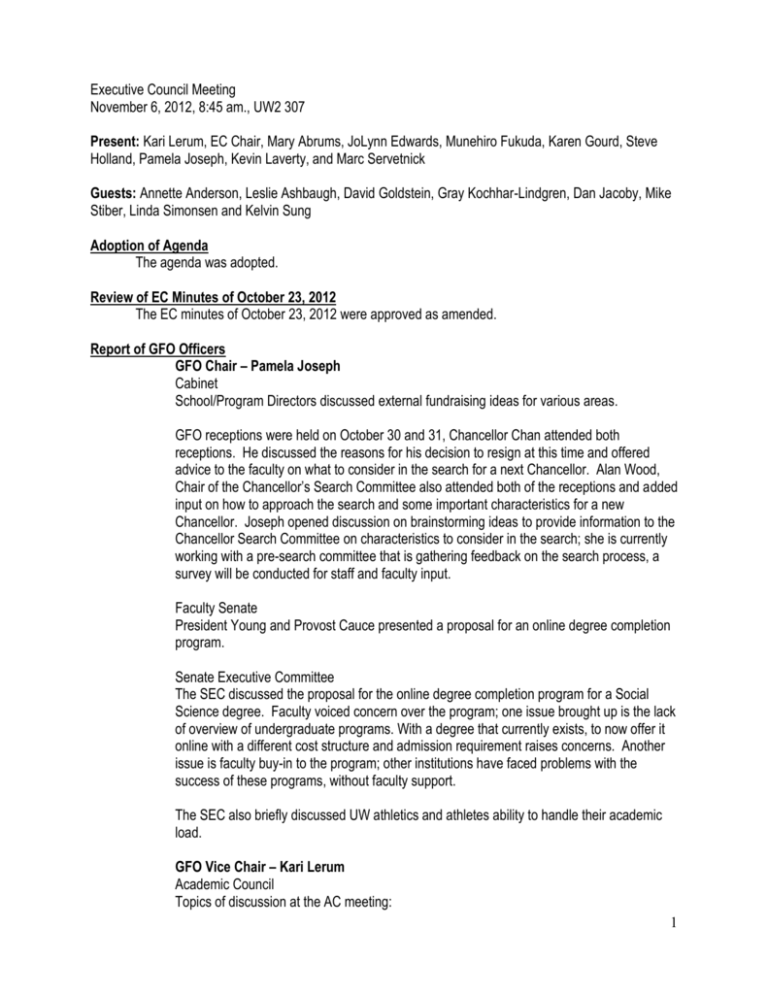
Executive Council Meeting November 6, 2012, 8:45 am., UW2 307 Present: Kari Lerum, EC Chair, Mary Abrums, JoLynn Edwards, Munehiro Fukuda, Karen Gourd, Steve Holland, Pamela Joseph, Kevin Laverty, and Marc Servetnick Guests: Annette Anderson, Leslie Ashbaugh, David Goldstein, Gray Kochhar-Lindgren, Dan Jacoby, Mike Stiber, Linda Simonsen and Kelvin Sung Adoption of Agenda The agenda was adopted. Review of EC Minutes of October 23, 2012 The EC minutes of October 23, 2012 were approved as amended. Report of GFO Officers GFO Chair – Pamela Joseph Cabinet School/Program Directors discussed external fundraising ideas for various areas. GFO receptions were held on October 30 and 31, Chancellor Chan attended both receptions. He discussed the reasons for his decision to resign at this time and offered advice to the faculty on what to consider in the search for a next Chancellor. Alan Wood, Chair of the Chancellor’s Search Committee also attended both of the receptions and added input on how to approach the search and some important characteristics for a new Chancellor. Joseph opened discussion on brainstorming ideas to provide information to the Chancellor Search Committee on characteristics to consider in the search; she is currently working with a pre-search committee that is gathering feedback on the search process, a survey will be conducted for staff and faculty input. Faculty Senate President Young and Provost Cauce presented a proposal for an online degree completion program. Senate Executive Committee The SEC discussed the proposal for the online degree completion program for a Social Science degree. Faculty voiced concern over the program; one issue brought up is the lack of overview of undergraduate programs. With a degree that currently exists, to now offer it online with a different cost structure and admission requirement raises concerns. Another issue is faculty buy-in to the program; other institutions have faced problems with the success of these programs, without faculty support. The SEC also briefly discussed UW athletics and athletes ability to handle their academic load. GFO Vice Chair – Kari Lerum Academic Council Topics of discussion at the AC meeting: 1 The proposal for an MS in Cyber Security Engineering was discussed; there was enthusiastic support for the program. Expansion of the UWB graduate programs at the Bellevue site. The School of Business offers graduate programs at their Eastside Leadership Center and would like to expand programs on the Eastside. EC discussion points Why is the focus on Bellevue, should we also consider other areas north and south in the Puget Sound region? Bellevue College has also expanded recently, is there still a market for UWB in the area? Canvas will replace Blackboard by 2014; no new courses will be posted on Blackboard in the future. Canvas is considered advantageous as it is more affordable and is an open source program. Rebecca Aanerud, Assistant Dean in Student Affairs in the UW Graduate School spoke to the AC about how her office might support professional development opportunities for UWB graduate students. EC discussion points Make Graduate Student Affairs aware that professional development for UWB students is at a Masters level, not a doctorate level. UWB needs TAs; this is one area that we could utilize the assistance of the Graduate Student Affairs Office. Expanding services for UWB graduates through the Graduate Student Affairs Office, bringing services here will increase support for our graduate students. Ongoing issues regarding GFO committees were discussed with the VCAA. There is a serious lack of support of faculty governance that is culminating this year in the lack of representation on GFO Councils and Committees. The CCASC and the IRSC are still not fully constituted. The Chair of the CCASC has expressed concern over the review of curriculum without full representation from all schools/programs. The EC could call a strategy session with the VCAA on this matter. EC discussion points Program Directors cannot thwart faculty governance by refusing to appoint representatives to GFO Councils or Committees. The GFO Bylaws, ratified by the faculty call for representation from all programs. The culture of shared governance could change at UWB if the faculty does not strongly support the GFO. Meeting of UW Chairs of Faculty Councils Holland reported on topics discussed at the meeting: Faculty salary merit pay will probably be based on a 4 – 5 year review, not just the previous year. Compression and inversion issues were discussed. Activity Based Budgeting at UW was discussed. 2 The Faculty Senate is pushing for diversity hires and more tenure track hiring at UW. Marcia Killien, Secretary of the Faculty and Jim Gregory, Chair of the Faculty are open to coming to UWB to speak with the faculty on shared governance, curriculum processes, the Student Conduct Code, the Diversity course requirements and other faculty concerns or issues. Senate Executive Committee (SEC) Joseph reported on the SEC discussion of a new committee at UW, the Intellectual Property and Commercialization Committee. Joseph pointed out to the committee that there was no representation from UWB or UWT on this committee and asked that anyone interested in working with the committee contact her. Old Business A. Proposal for a MS in Cyber Security Engineering – Mike Stiber, Kelvin Sung and Annette Anderson Sung presented the revised Proposal for an MS in Cyber Security Engineering (CSE) to the EC. He outlined the changes to the proposal: The relationship of the PCE is explicitly stated in the proposal and the self-sustaining nature of the program. A MOA will be finalized to define the relationship between CSS and PCE. CSS and the proposers names have been added to the proposal A budget has been provided Removal of “unknown” competencies There is more emphasis on ethical issues Courses are listed numerically The EC reviewed the revised proposal, discussion followed. EC discussion points The cost per student per year of approximately $24,000 for fees, is this lower than graduate tuition? Tuition is $800.00 per credit, with no variation in the in-State or out-of-State tuition. The Cyber Security Code of Conduct holds students to different standards than the UW Code of Conduct. EC motion Joseph moved to pass the motion: “The EC approves moving the proposal for a MS in Cyber Security Engineering to a second reading”. The motion was seconded, discussion followed. EC discussion points A narrative on the course sequencing would be helpful. State the per credit tuition fee structure. Recommendation – revise the Cyber Security Code of Conduct, give students a website to access or remove it from the proposal. The EC does not need to approve this Code of Conduct. 3 This proposal is ready for EC action; a second reading is not required. We can approve this proposal with amendments. With consideration given to the expressed opposition to moving this proposal to a second reading, Lerum calls the question on the original motion. No further discussion followed and hearing no objections, Lerum called for a vote, the motion carried (5 yes, 3 no) to move the proposal to a second reading. B. Update on search committee for Academic Misconduct Officer - Gray Kochhar-Lindgren Kochhar-Lindgren updated the EC on the search for an Academic Misconduct Officer, no faculty have come forward to serve on the committee at this time. He extends an open invitation to the faculty; anyone wishing to serve on the committee can contact him. A search will begin in early January. New training for the UW Disciplinary Committee will be held. C. Implementing the campus-wide learning goals. (Goldstein and G. Kochhar-Lindgren) Gray Kochhar-Lindgren, Associate Vice Chancellor of Undergraduate Education opened discussion on implementing the UWB Campus Learning Goals. He and David Goldstein, the Director of the Teaching and Learning Center are working on a template to articulate a network of assessment practices to begin implementation of the Learning Goals. The development of a matrix may reveal intersections between program/school goals and campus goals, showing where there are gaps and where overlaps occur, framing the big picture. Once we can assess learning goals and outcomes, we can look at coursework, curriculum and extra-curricular pathways for students to achieve the outcomes that the schools/programs have articulated. The UWB Learning Goals are focused on undergraduate goals; schools/programs can use these goals to inform their school or program goals. The UWB campus-wide learning goals will be addressed in CUSP but each school or program will have their own learning goals and assessment tools. Graduate learning goals may have different degree expectations. The next steps involve assessment and operationalizing the learning goals and the leadership from CUSP and the TLC is invaluable in this process. D. CUSP Representation on EC – Lerum The EC is gathering input from schools/programs on this issue. New Business A. Student Success Center - G. Kochhar-Lindgren Postponed to a later date. B. Proposal for new awards for faculty – Joseph UWB awards the Distinguished Teaching Awards each year, in the past the Worthington Award was also given for technology, but it is no longer offered at UWB. Faculty have expressed interest in awards for more than teaching, some areas for awards: Advising/Mentoring Scholarship Research Community Service Service 4 Fukuda spoke about the Second Chance Royalty Research Grant to fund meritorious but unfunded Royalty Research Fund proposals. He will get input from the IRSC on awards at UWB. The first meeting of the IRSC will be scheduled in November. Faculty Voices at the UWB retreat asked about how faculty at UWB are rewarded, what awards align with promotion and tenure standards, what is the criteria and process for awards here and are awards given to non-tenure track faculty? Awards can be useful in merit review; the DTA award is available to non-tenure track faculty. The EC could draft a proposal for Academic Council on the award structure here and propose additional awards. This will be revisited at a later date. C. American Association of University Professors (AAUP) UW-chapter - Jacoby Professor Jacoby spoke to the EC about the American Association of University Professors (AAUP) UW chapter. The AAUP is an independent organization working on developing standards for academic practice and policies on academic freedom. The UW has a voluntary list serve for membership, although members pay dues. Jacoby talked about integrating our activities and issues with the AAUP in some pivotal areas: Contingent Faculty Issues. UWB has ongoing discussions on non-tenure track faculty; Bruce Kochis has held forums on this issue. UWB has 43 – 50 % non-tenure track faculty. Higher Education Funding/Tuition Faculty salary increases and tuition increases can impact the relationship with students. Online Education Education on Faculty Unions With the campus growth and the growth of faculty at UWB, should we think about a more active professional caucus, an AAUP chapter at UWB? Membership in the AAUP could provide another forum for faculty to think about professional issues. The AAUP could help address some of the faculty governance issues at UWB. D. Faculty and staff access to the athletic field, gym, etc. (Lerum) Postponed to a later date. E. Tri-campus Review of the Mathematics Proposal (Simonsen) Professor Simonsen submitted the S&T responses to the tri-campus review of the Mathematic Proposal to the EC. Responses addressed the following: The UW Math Department questioned staffing levels at the graduate level with broad mathematical training. The program will hire an Associate and Assistant Professor of Mathematics, both research mathematicians with the ability to teach upper level courses in the degree. Faculty will also be active participants in advising students. The goal is to hire two research faculty and two other tenure positions in applied mathematics for this degree. Should the UWB Mathematics degree be a B.S. or a B.A? One of the concerns involves UWB’s course numbering; it appeared that the UWB major had fewer requirements than the UWS degree (16 one-quarter math courses at UWB compared to 20 at UWS). UWB courses are 5-credit compared to 3-credit courses at UWS. The depth of content covered in these courses will be more equivalent to a UWS 5 full year sequence. The UWB degree requires a total of 65 credits in upper level mathematics with 5 credits in each of Advanced Multivariable Calculus, Real Analysis, and Modern Algebra. The science requirement covered in the UWB degree represents a BS in mathematics. Insufficient diversity in upper division math courses. This issue will be addressed over time, as new faculty members are hired; UWB will increase the number and diversity of our upper-level mathematics courses. S&T will also consider adding courses to the Mathematic Electives category. This will help students wishing to take UWS math courses. S&T graduates in this program will be focused on teaching secondary mathematics and obtaining careers in STEM fields with some students entering graduate school. UWS may have to open a few sections for UWB students and the program will have ongoing communication with UWS on this. EC motion Joseph moved to pass the motion: “The EC gives final approval of the BS in Mathematics. The EC has determined that the proposing faculty have duly considered and responded to the comments posted by faculty from across the three campuses during the tri-campus review period. The motion was seconded no further discussion was held. Hearing no objections, Lerum called for a vote, the motion carried unanimously. Reports from Program Representatives A. Business - Laverty Business is conducting 3 searches. Two offers were made for one of the positions, one offer was declined. In addition the faculty is considering approving shifting a contract from the Foster School of Business. B. Computing and Software Systems - Fukuda An opportunity hire was declined by the CSS program on a principle researcher from Microsoft, there was not a sufficient research record for the program to accept the candidate. C. Education – no report D. Interdisciplinary Arts & Sciences – Edwards Searches are underway. E. Nursing – Abrums Discussions on expanding outside programs beyond the Mt. Vernon location are being held. F. Science & Technology – no report 6 Good of the Order Lerum spoke to the EC about the Diversity Program’s work to draft a document to assist faculty search committees with strategies that could be used at UWB to help identify what diversity means in the hiring process. Meeting adjourned at 10:45 am Minutes submitted by Barbara Van Sant The next meeting will be November 20, 2012. 7
